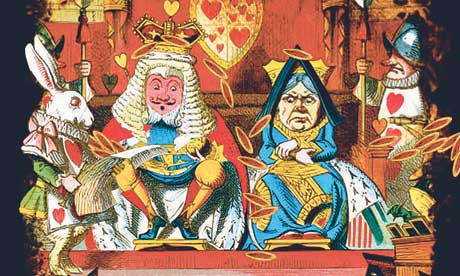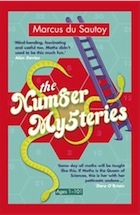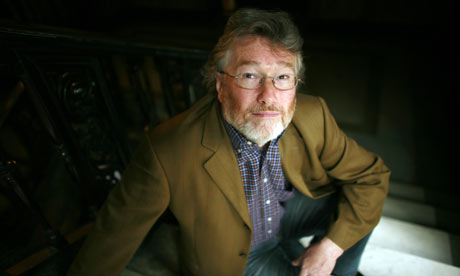Liked the book? Try the app
Eager to find new ways to involve his readers in the mysteries of numbers, mathematician Marcus du Sautoy looked to new technology. A revolution is coming, he argues, and the whole idea of what a book can do is about to change

Consider two books: Hilary Mantel’s Wolf Hall and Lewis Carroll’s Alice in Wonderland. Not the printed books, the apps – software for mobiles and the iPad. The Wolf Hall app is a thing of beauty. It contains the text, of course, but readers can also move slickly between the text, family trees of the Tudors and the Yorkists, extra articles by Mantel and a fascinating video discussion between the novelist and historian David Starkey. All of which gives a deeper and richer understanding of the novel’s historical context and its characters.
But this is nothing compared to Alice for the iPad. You can throw tarts at the Queen of Hearts, help the Caterpillar smoke his hookah pipe, make Alice grow as big as a house and then shrink again. You can watch as “the Mad Hatter gets even madder”, and throw pepper at the Duchess. Over the 52 pages of the app there are 20 animated scenes. Each illustration has been taken from the original book and has been made gravity-aware, responding to a shake, tilt or the touch of a finger. The story is never the same twice, because users are Alice’s guide through Wonderland. The Caterpillar will smoke his hookah in a new way when you tilt your iPad, or you can throw more pepper the second time around.
It would have been quite simple to convert the printed files of Carroll’s book and drop it straight on to the iBookstore, but what Atomic Antelope (atomicantelope.com) has done, through painstaking artistry, is to capture, for adults and children alike, the fantastical nature of the story. This is about recreating what a book is and can be. With the advent of new technology – devices such as the iPhone or iPad, the Sony Reader or the Kindle – authors and publishers are being offered a huge challenge: to reconceive their content to provide a visual and interactive experience that the printed book cannot provide. Art books with huge numbers of accessible images; architecture books with 3D plans of buildings; travel books with videos and interactive maps; children’s books with games and characters who introduce themselves; and so on and on. The potential is vast. This is not a case of simply trying to cram written content on to an e-reader; this is about taking that content and completely reinventing it.
Currently readers are being offered little more than the novelty of a book on an electronic device, but the thrill of turning the page by clicking a button quickly pales. Many of the current projects are just tarted-up books for electronic media, but if it doesn’t move the experience on to a new level, to enhance the material, what’s the point? What authors and publishers need to do is to go back to the drawing board and, at the moment ideas are conceived, work out how – if at all – to make use of these new toys.
Before we get too cross-eyed about what the technology can do, there are a number of caveats. In 80 days Apple sold 3m iPads worldwide. It’s a staggering amount, but on the tube people reading books outnumber those reading from iPads by more than 100 to one. And books are a great invention. They are durable, portable. Their batteries don’t run out. They look great, and it is much easier to show off that you are reading Tolstoy in the original with a paperback than it is on an e-reader. Perhaps most important, the rules for publishing, say, Annie Proulx’s short stories are not the same as those for publishing Simon’s Cat on a portable Playstation. What can and should be done with one type of book will not necessarily translate to another.
Non-fiction surely provides more potential than fiction. It’s difficult to see what else could be done with a novel such as Wolf Hall, however elegant the app. (And to read the novel on an iPhone would take 40,000 swipes or tilts of the screen.) The exception is children’s fiction. Already game developers and publishers are working on augmented-reality books that follow on from Mobile Art Lab’s PhoneBook, available from Amazon Japan, a hybrid that combines the iPhone with an ordinary book. The iPhone is placed inside the covers of a picturebook and, as you turn the page, you simultaneously turn the page on the iPhone to reveal interactive imagery.
Non-fiction is different again. What is a footnote, after all, but an attempt to break out of the linear structure of a book? How reference books could change can now begin to be imagined, but I’m particularly interested in apps for non-fiction that are not designed to break up a narrative in a radical way, but rather to augment a storyline – for me, non-fiction works best when it tries to emulate the narrative that drives a reader to the end of a novel.
To understand how to make the most of the new technology, I decided to go back to first principles and analyse what it is that I do as a mathematician and a writer. My job is, as the jargon goes, to “deliver content” in as many different forms and to as many different people as possible. I prove theorems; I present TV and radio programmes; lecture in schools, universities, prisons and to government; I collaborate with theatre companies and composers to create artistic pieces that explore mathematical themes; and I’ve worked with games developers to create mangahigh.com, an internet maths school that allows students to play and get better at maths. None of this will change. Now, however, technology has become so sophisticated in the way it engages its users that I can bring something of the experience of TV and lecturing to the books I write.
My new book, The Num8er My5teries, could have been written before the advent of the digital age and the arrival of smartphones and web-browsing ereaders. But these technologies offer new possibilities. The book is being launched in conjunction with a gaming app, and is an interactive experience: for the first time, I’m using technology to bring the maths alive – to demonstrate, in real time, problems that until now have been explained only in ink or in person.
As the book evolved, it became clear that it was bursting to get free of the constraints of the page. Mathematics is not a spectator sport. You want your readers to get their hands dirty, exploring, investigating, playing and achieving their own “aha” moments. The book contains mathematical experiments that explore the dynamics of population growth, experiments that are best appreciated by doing them yourself; and there are games whose mathematical strategies the reader can try out on the app.
The experience is still highly text-based; it’s not a book that would work better as a website, and it’s far from a videogame. It has a strong narrative line, telling the story of five of the greatest unsolved problems in mathematics. The first mystery is the challenge of finding a pattern behind the enigmatic prime numbers. A curious cicada in north America turns out to have been the first species to embark on an exploration of these numbers. The book describes an experiment that helps readers to explore why primes might have been the key to the evolutionary survival of this strange insect. But it is the unpredictability of these numbers as one climbs through the universe of numbers which represents one of the biggest mathematical mysteries. A game of prime number hopscotch gives the reader a real feeling for their wild behaviour, as do the page numbers, which vary according to whether they are prime or not.
Other mysteries include the search for the elusive shape of the universe. Exploring the bagel shape that hides behind the 1970s videogame Asteroids turns out to be the best warm-up to navigating the four-dimensional contours of our real universe. The ability to predict certain developments in the future using the equations of maths is something that not only mathematicians but also climate scientists, astronomers and economists would love to develop.
One chapter has games at its heart. Mathematics is a very powerful tool for producing winning strategies in a range of games, from Monopoly to chocolate-chilli-roulette, from the lottery to the roulette wheel. But there are some games that are currently beyond the limits of mathematics. It is these unsolved mysteries which make it a living subject, constantly evolving, changing and surprising.
The Num8er My5teries draws heavily on technology from Japan, and features, among the games and puzzles, Quick Response (QR) codes. These are rather peculiar-looking barcodes that, when you take a photo of them with your smartphone, will take you out of the book to different websites to show you maths in action. My favourite is the video I’ve included of Roberto Carlos demonstrating chaotic and laminar turbulence in one of the most staggering free-kicks ever taken in the history of football . Watching a video of Carlos bending the ball delivers something that no explanation in words or still photos ever could. These QR codes were first used on a dating site where teenagers would wear a T-shirt with a code on the back – if you were interested, you took a photo, followed the link to the website and got in touch.
The Num8er My5teries is still intended to work as a traditional literary experience – to provide a place in which to immerse yourself for more than just a few clicks through pages on the web. It is still principally linear, with a narrative to take you from A to B. But it also aspires to be something different, something more than a book. The games and experiments are there to get the reader actively involved. As Clay Shirky’s new book Cognitive Surplus argues, the internet, computer games and mobile devices are creating a new generation of active producers and sharers of content, rather than passive consumers. New technology, far from dumbing us down, is getting us involved in building a more engaged, democratic and creative world.
Ebooks and apps make it possible to reconceive books for devices that people use to email, call, play games and tweet, in a way that allows an author to reach people who have rarely bought books before. Conversations have begun between publishers and the gaming industry, who previously have had nothing to say to one another.
The future offers much more. One of the most intriguing prospects for me is to use social networking facilities to conduct mass-participation experiments to explain the science discussed in a book. You can already download for nothing an app that allows you to join the Galaxy Zoo project to help astronomers explore the universe. Twitter and Facebook offer the opportunity to create communities bound together by the experience of reading a particular book. The app that lets you read the series of Scott Pilgrim comics on your smartphone is already exploiting the power of social networking to create dialogue between readers, who use the characters from the comics as their avatars.
Authors and composers have for centuries explored ways for readers or listeners to have some involvement in the act of creation – to navigate their way through a piece to create a unique, personal composition. Obvious problems are encountered. Mozart’s Musikalisches Würfelspiel, or musical dice game, produces a different waltz according to the throw of the dice (it is available through an app). The game can produce around 46 million billion different waltzes. Played one after the other, it would take 200m years to hear every waltz. But none of the waltzes compares to any of the compositions that Mozart had total control over.
BS Johnson’s notorious 1969 novel The Unfortunates was unbound and published in a box. The first and last chapters are fixed but readers can choose the order of the 25 chapters that form the body of the book. That’s 15,511,210,043,330,985,984 million different books. The French writer Raymond Queneau, co-founder of the Oulipo movement, provided readers with even more options with his sequence of sonnets in which there is a choice of 10 different versions for each of the 14 lines of the sonnets. Like Mozart’s dice game, this produces work that would take over 200m years to recite. For me, it is a mathematician, Henri Poincaré, who best sums up the problems with these attempts: “To create consists precisely in not making useless combinations. Invention is discernment, choice . . . The sterile combinations do not even present themselves to the mind of the inventor.”
But that doesn’t mean that the new technology doesn’t offer readers a chance gratifyingly to navigate their own passage through a narrative. The challenge of how to use this technology without breaking the narrative experience shares something with television trying to discover what it can do creatively with the red button to enhance rather than interrupt the viewer’s experience. It’s a problem TV has not really been able to crack yet.
The gaming industry has probably made most progress with creating interactive narratives. The Playstation3 game Heavy Rain allows players to make choices at points during the game, resulting in a seamless film-noir experience that varies from player to player. Because you’re responsible for the death of a central character in the closing sequences, you feel more emotionally involved. Fable II for Xbox sees your character morphing, becoming more or less evil, fatter or thinner, according to your actions. Bodies such as the Independent Game Developers’ Association are now seeking out traditional “content providers” to collaborate on new digital projects, and some authors are being drawn to experiment with writing for the gaming industry. Graham Joyce, who has won the British Fantasy award four times, was hired in 2009 to write the storyline for the fourth instalment of the shoot-’em-up videogame Doom.
Such collaborations are beginning to break down barriers. Three years ago the government launched a scheme to provide funding to UK companies that collaborate on digital initiatives in an attempt to stimulate new ideas. Similarly, Artist’s eBooks (artistsebooks.org) has been set up to explore “new platforms and formats” for authors. One book that it features, Niven Govinden’s L’histoire de Bexhill Baudelaire, includes links to YouTube videos which comprise the book’s soundtrack.
Marvel Comics’ app gives you access to more than 500 comic books, featuring Iron Man, Captain America, Spider-Man, Hulk, Thor and more of the world’s most popular superheroes. The app brings the world of Marvel to iPad owners with each comic presented at high resolution, and includes a search engine and innovative viewing options. But apps such as this also often feature a comic shop locator, allowing users to source a local retailer – an indication that the app editions are at present being seen as supplementary to the printed book, not a cannibalisation of an existing market. (I am very grateful to Robin Harvie of Fourth Estate for many of these examples.)
In January, the Diary of Samuel Pepys app was launched – iPhone and iTouch users are sent the relevant diary entries for each day. This, of course, is merely offering a new way to read wonderful things. Writing for new platforms – Japanese mobile phone novels, such as Deep Love by “Yoshi”, are an obvious example – is only just beginning. (For a taste, see theliteraryplatform.com.)
Though one of the central themes of The Num8er My5teries is the power of mathematics to work out what will happen next, maths isn’t much use in predicting the shape that books will take in the decades to come. The nature of literary fiction is unlikely to change, but in different areas of publishing new developments are inevitable. Reading experiences can take many forms. I am always on the lookout for new ways to convey the excitement of my subject, and have now begun to take advantage of the amazing new technology being developed to enrich a reader’s experience. Things are changing fast. Like every writer, I’m already thinking about the next book. But when it arrives, it may not look the way you expect it to.
Read my new memoir: Rosaries, Reading, Secrets: A Catholic Childhood in India (US) or UK.
Connect on Facebook: https://www.facebook.com/anitamathiaswriter/
Instagram: https://www.instagram.com/anita.mathias/
Twitter: https://twitter.com/AnitaMathias1
My book of essays: Wandering Between Two Worlds (US) or UK


